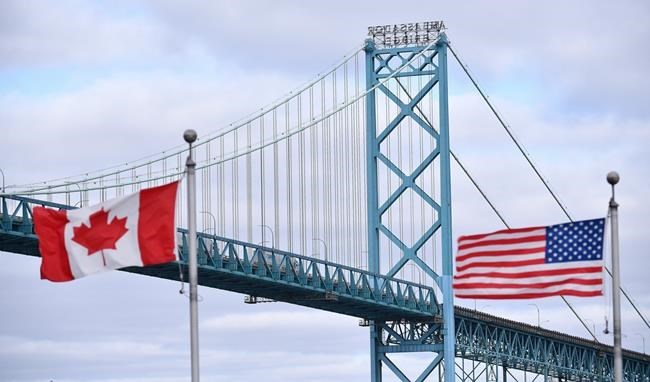Canadians with family in the United States expressed relief Wednesday at the prospect of soon being able to drive across the border to visit their loved ones.
Betty Chaborek, who turned 77 on Wednesday, likened the easing of restrictions for fully vaccinated Canadians to "a super birthday present."
"I'm so excited that I can barely wait. I was ready to go today," Chaborek said with a chuckle during a phone interview.
The U.S. plan, first announced by New York congressman Brian Higgins late Tuesday, is set to take effect in early November, although a firm start date has not been released. It's also unclear whether Canadians who received mixed vaccine doses will be deemed eligible.
For Chaborek, however, the news was nonetheless welcome.
The Windsor, Ont., resident said there had been many times during the pandemic when she'd stare at traffic on the Ambassador Bridge border crossing from her condo and wonder when she'd be allowed to drive over to see her family in the U.S.
Prior to the U.S. land border closing to Canadians when the pandemic hit, Chaborek said she would visit her daughter, her son-in-law and their two children in Michigan almost every weekend.
Chaborek said she’s looking forward to catching up with her family and celebrating upcoming holidays with them.
"This is absolutely incredible that we have the freedom to live our life like we want," she said. "It’s been too long."
Mike Osborne also couldn't contain his excitement after hearing the news about the border reopening.
The Welland, Ont., resident said he used to see his daughter, her husband and their two-year-old son in Niagara Falls, N.Y., a few times a week before the global health crisis began.
"I've been waiting for such a long time to be able to cross over and see family actually, you know, physically, instead of it being always on FaceTime or Messenger and stuff like that," he said.
The border being closed was especially difficult for his family, Osborne said, as he lost his wife to cancer in May — three days after Mother's Day — and his daughter could only come across into Canada for short compassionate visits. He and his family in the U.S. haven't seen each other since his wife died, he added.
"To know now that the border’s opening up to us, it'll give us the time for us to heal together, in a physical way," said Osborne.
Osborne said he is going to visit his family as soon as he can and plans to "spoil" them.
"We definitely are going to be celebrating Christmas. We're probably going to make up for Thanksgiving. We're going to make up for Easter," he said. "I think we're going to do all the holidays in about a week's time."
Jaslyn DeClercq, who has been in a four-year, long-distance relationship with her fiancé who lives in Ohio, said she also was yearning to make up for lost time.
The Tillsonburg, Ont., resident said she started crying in her car when she heard the land border was reopening.
"It’s been a long 19 months," she said.
Before COVID-19 hit, DeClercq said she and her American fiancé saw each other every weekend, if not every other weekend.
It's been especially "heartbreaking" to tell their two-year-old daughter that she couldn't regularly see her father due to the pandemic, she said. DeClercq and her daughter flew to the U.S. for the little girl's birthday, and her father has made two trips to Canada during the pandemic, she said.
"It was a drastic change and not one that I ever want to see happen to any family ever again," DeClercq said.
"I'm looking forward to being able to drive down to (my fiancé's) home and spend the family time that we've been waiting two years to spend together."
Fully vaccinated U.S. citizens and permanent residents have been allowed back into Canada since August, provided they have waited at least 14 days since getting a full course of a Health Canada-approved vaccine and can show proof of a recent negative COVID-19 test.
The U.S. will not be requiring travellers to show proof of a negative test for COVID-19 as part of the new easing of restrictions.
This report by The Canadian Press was first published Oct. 13, 2021.
———
This story was produced with the financial assistance of the Facebook and Canadian Press News Fellowship.
Noushin Ziafati, The Canadian Press




